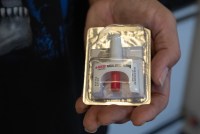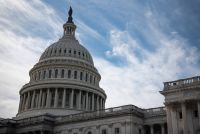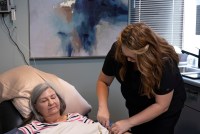Latest KFF Health News Stories
California Prison Drug Overdoses Surge Again After Early Treatment Success
Drug overdose deaths in California state prisons rebounded to near record levels last year, a big setback for corrections officials who thought they were on the right track with medication-assisted treatment efforts. Prison officials and attorneys representing prisoners blame fentanyl.
For the Love of Health Care and Health Policy
KFF Health News shares the crème de la crème of reader-submitted health policy valentines. Two of our favorites melted our hearts and inspired original illustrations.
In Fight Over Medicare Payments, the Hospital Lobby Shows Its Strength
Medicare pays hospitals about double what it pays other providers for the same services. The hospital lobby is fighting hard to make sure a switch to “site-neutral payments” doesn’t become law.
¿Ofrecer vivienda gratis es atención médica? Programas de Medicaid dicen que sí
Estados están invirtiendo miles de millones de dólares en un experimento de atención médica de alto riesgo: utilizar fondos ya escasos de seguros de salud públicos para proporcionar vivienda a los estadounidenses más pobres y enfermos.
GoFundMe, ¿realmente ayuda a pagar facturas médicas?
Incluso defensores de pacientes y personal del área de ayuda financiera en hospitales recomiendan iniciar una sesión en GoFundMe como una alternativa a terminar con una cuenta en una agencia de cobros.
GoFundMe Has Become a Health Care Utility
Resorting to crowdfunding to pay medical bills has become so routine, in some cases health professionals recommend it.
Senators Weigh Whether Health Care AI Needs a Leash
The Senate Finance Committee contemplated the future yesterday: artificial intelligence and its potential applications to health care. And it turns out the future looks an awful lot like the past and present: Democrats want regulations. And the industry wants money. “There are a lot of reasons to be optimistic,” Finance Committee Chair Ron Wyden (D-Ore.) […]
La FDA finalmente prohibiría peligroso químico en productos para alisar el cabello
El primer estudio que vinculó los alisadores de cabello con el cáncer de útero, publicado en 2022, encontró que el uso frecuente de estos químicos duplica con creces el peligro.
FDA’s Plan to Ban Hair Relaxer Chemical Called Too Little, Too Late
The FDA’s recent notice that it would move to ban formaldehyde in hair-straightening products comes more than a decade after researchers raised alarms about health risks. Scientists say a ban would still leave many dangerous chemicals in hair straighteners.
Colorado avanza con proyectos para conectar a trabajadores agrícolas con servicios de salud mental
Los proyectos de ley en consideración abordarían la creciente necesidad de tratar los problemas de salud mental en áreas rurales, que se han visto exacerbados por los impactos de la pandemia y el cambio climático.
Cerca de 10 millones ya perdieron Medicaid, y todavía faltan meses de purga
Medicaid y el Programa de Seguro de Salud Infantil crecieron hasta alcanzar un récord de 94 millones de inscritos durante la pandemia.
Colorado Moves to Connect Agricultural Workers With Mental Health Resources
Advocates say two bills under consideration could help migrant communities but that more needs to be done.
Halfway Through ‘Unwinding,’ Medicaid Enrollment Is Down About 10 Million
While more Medicaid beneficiaries have been purged in the span of a year than ever before, enrollment is on track to settle at pre-pandemic levels.
Halfway Through ‘Unwinding,’ Medicaid Enrollment Is Down About 10 Million
We’re halfway through the Medicaid “unwinding,” in which states are dropping people from the government health insurance program for the first time since the pandemic began. Millions of people have been dumped from the rolls since April, often for procedural issues like failing to respond to notices or return paperwork. But at the same time, […]
Is Housing Health Care? State Medicaid Programs Increasingly Say ‘Yes’
States are using their Medicaid programs to offer poor and sick people housing services, such as paying six months’ rent or helping hunt for apartments. The trend comes in response to a growing homelessness epidemic, but experts caution this may not be the best use of limited health care money.
Congressman Off-Base in Ad Claiming Fauci Shipped Covid to Montana Before the Pandemic
Facts don’t support claims by a likely Republican Senate candidate that a federal research laboratory in Montana infected bats with a coronavirus from China before the covid-19 outbreak.
Is the Nation’s Primary Care Shortage as Bad as Federal Data Suggest?
Federal policymakers have been trying for a long time to lure more primary care providers to understaffed areas. The Biden administration boosted funding in 2022 to address shortages and Sen. Bernie Sanders (I-Vt.) pushed sweeping primary care legislation in 2023. But when KFF Health News set out last year to map where the primary care workforce shortages really are — and where […]
Montana Vows Changes to Avoid Delayed Contracts. Some Health Providers Still Await Back Pay.
The head of Montana’s health department said the agency is catching up on a months-long backlog of contracts with organizations that connect people to medical care that left organizations without pay, halted some services, and triggered job cuts.
The FTC Is Attacking Drugmakers’ ‘Patent Thickets’
It’s a big job clearing out so-called “patent thickets” drugmakers create to keep their products’ prices high. But the Federal Trade Commission is giving it a shot.
Ketamine Therapy for Mental Health a ‘Wild West’ for Doctors and Patients
Ketamine, approved by the FDA as an anesthetic in 1970, is emerging as a major alternative mental health treatment, and there are now more than 500 ketamine clinics around the country. But with little regulation and widely varying treatment protocols, it’s a medical “wild West.”



















